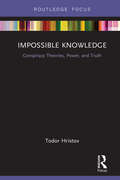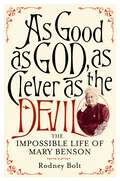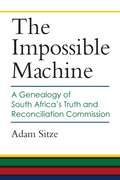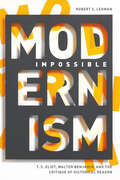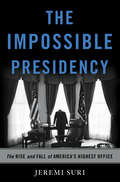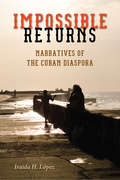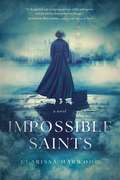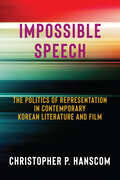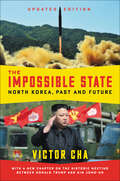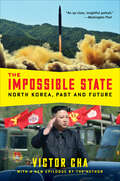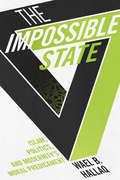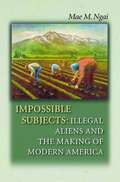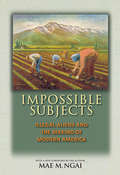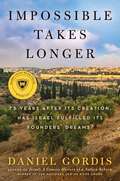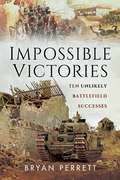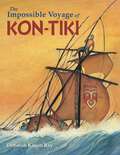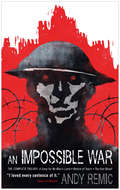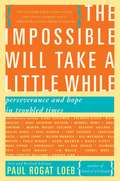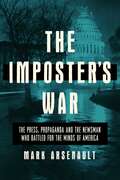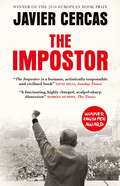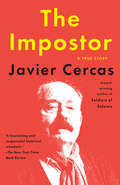- Table View
- List View
Impossible Knowledge: Conspiracy Theories, Power, and Truth (Conspiracy Theories)
by Todor HristovConspiracy theorists claim impossible knowledge, such as knowledge of the doings of a secret world government. Yet they accept this impossible knowledge as truth. In effect, conspiracy theories detach truth from knowledge. Knowledge without power is powerless. And the impossible knowledge claimed by conspiracy theorists is rigorously excluded from the regimes of truth and power – that is not even wrong. Yet conspiratorial knowledge is potent enough to be studied by researchers and recognized as a risk by experts and authorities. Therefore, in order to understand conspiracy theories, we need to think of truth beyond knowledge and power. That is impossible for any scientific discipline because it takes for granted that truth comes from knowledge and that truth is powerful enough to destroy the legitimacy of any authority that would dare to conceal or manipulate it. Since science is unable to make sense of conspiracy theories, it treats conspiracy theorists as individuals who fail to make sense, and it explains their persistent nonsense by some cognitive, behavioral, or social dysfunction. Fortunately, critical theory has developed tools able to conceive of truth beyond knowledge and power, and hence to make sense of conspiracy theories. This book organizes them into a toolbox which will enable students and researchers to analyze conspiracy theories as practices of the self geared at self-empowerment, a sort of political self-help.
The Impossible Life of Mary Benson: The Extraordinary Story of a Victorian Wife
by Rodney BoltThe remarkable true story of the life of Mary Benson: wife of an archbishop, friend of Queen Victoria, mother of three "unpermissably gifted" children—including E. F. Benson, and in love with dozens of womenSometimes touching and sometimes hilarious, this is the story of one lovable, brilliant woman and her trajectory through the often surprising opportunities and the remarkable limitations of a Victorian woman's life. Young Minnie Sidgwick was just 12 years old when her cousin, 12-year-old Edward Benson, proposed to her in 1853. Edward went on to become Archbishop of Canterbury and little Minnie—as Mary Benson—to preside a social world that ranged from Tennyson, Henry James, and Oscar Wilde to foreign royalty and Queen Victoria herself. Yet Mrs. Benson's most intense relationships were not with her husband and his associates, but with other women. When the Archbishop died, Mary, or "Ben" to her intimates, turned down an offer from the Queen to live at Windsor, and set up home in a Jacobean manor house with her friend Lucy Tait. Drawing on the diaries and novels of the Bensons themselves, including E. F. Benson's Mapp and Lucia novels, as well as the writing of contemporary writers and poets, this book creates a very rich portrait of Mary Benson, her family, her close female friends, and their world.
The Impossible Lives of Greta Wells: A Novel
by Andrew Sean GreerFrom the critically acclaimed author of the New York Times bestseller The Confessions of Max Tivoli comes The Impossible Lives of Greta Wells, a rapturously romantic story of a woman who finds herself transported to the “other lives” she might have lived.After the death of her beloved twin brother and the abandonment of her long-time lover, Greta Wells undergoes electroshock therapy. Over the course of the treatment, Greta finds herself repeatedly sent to 1918, 1941, and back to the present. Whisked from the gas-lit streets and horse-drawn carriages of the West Village to a martini-fueled lunch at the Oak Room, in these other worlds, Greta finds her brother alive and well—though fearfully masking his true personality. And her former lover is now her devoted husband…but will he be unfaithful to her in this life as well? Greta Wells is fascinated by her alter egos: in 1941, she is a devoted mother; in 1918, she is a bohemian adulteress.In this spellbinding novel by Andrew Sean Greer, each reality has its own losses, its own rewards; each extracts a different price. Which life will she choose as she wrestles with the unpredictability of love and the consequences of even her most carefully considered choices?
The Impossible Machine: A Genealogy of South Africa's Truth and Reconciliation Commission
by Adam SitzeAdam Sitze meticulously traces the origins of South Africa's Truth and Reconciliation Commission back to two well-established instruments of colonial and imperial governance: the jurisprudence of indemnity and the commission of inquiry. This genealogy provides a fresh, though counterintuitive, understanding of the TRC's legal, political, and cultural importance. The TRC's genius, Sitze contends, is not the substitution of "forgiving" restorative justice for "strict" legal justice but rather the innovative adaptation of colonial law, sovereignty, and government. However, this approach also contains a potential liability: if the TRC's origins are forgotten, the very enterprise intended to overturn the jurisprudence of colonial rule may perpetuate it. In sum, Sitze proposes a provocative new means by which South Africa's Truth and Reconciliation Commission should be understood and evaluated.
Impossible Modernism: T. S. Eliot, Walter Benjamin, and the Critique of Historical Reason
by Robert LehmanImpossible Modernism reads the writings of German philosopher and critic Walter Benjamin (1892-1940) and Anglo-American poet and critic T. S. Eliot (1888-1965) to examine the relationship between literary and historical form during the modernist period. It focuses particularly on how they both resisted the forms of narration established by nineteenth-century academic historians and turned instead to traditional literary devices--lyric, satire, anecdote, and allegory--to reimagine the forms that historical representation might take. Tracing the fraught relationship between poetry and history back to Aristotle's Poetics and forward to Nietzsche's Untimely Meditations, Robert S. Lehman establishes the coordinates of the intellectual-historical problem that Eliot and Benjamin inherited and offers an analysis of how they grappled with this legacy in their major works.
The Impossible Presidency: The Rise and Fall of America's Highest Office
by Jeremi SuriA bold new history of the American presidency, arguing that the successful presidents of the past created unrealistic expectations for every president since JFK, with enormously problematic implications for American politicsIn The Impossible Presidency, celebrated historian Jeremi Suri charts the rise and fall of the American presidency, from the limited role envisaged by the Founding Fathers to its current status as the most powerful job in the world. He argues that the presidency is a victim of its own success-the vastness of the job makes it almost impossible to fulfill the expectations placed upon it. As managers of the world's largest economy and military, contemporary presidents must react to a truly globalized world in a twenty-four-hour news cycle. There is little room left for bold vision.Suri traces America's disenchantment with our recent presidents to the inevitable mismatch between presidential promises and the structural limitations of the office. A masterful reassessment of presidential history, this book is essential reading for anyone trying to understand America's fraught political climate.
The Impossible Rescue: The True Story of an Amazing Arctic Adventure
by Martin W. SandlerThe dead of an Arctic winter. Whaling ships full of men, stranded in ice. Follow three rescuers in a race against time--and all odds--in this heartpounding true adventure. Martin W. Sandler takes us on every step of their riveting journey, facing raging blizzards, killing cold, injured sled dogs, and setbacks to test the strongest of wills.
Impossible Returns: Narratives of the Cuban Diaspora
by Iraida LopezIn this one-of-a-kind volume, Iraida López explores various narratives of return by those who left Cuba as children or adolescents. Including memoirs, semi-autobiographical fiction, and visual arts, many of these accounts feature a physical arrival on the island while others depict a metaphorical or vicarious experience by means of fictional characters or childhood reminiscences. As two-way migration increases in the post-Cold War period, many of these narratives put to the test the boundaries of national identity. Through a critical reading of works by Cuban American artists and writers like María Brito, Ruth Behar, Carlos Eire, Cristina García, Ana Mendieta, Gustavo Pérez Firmat, Ernesto Pujol, Achy Obejas, and Ana Menéndez, López highlights the affective ties as well as the tensions underlying the relationship between returning subjects and their native country. Impossible Returns also looks at how Cubans still living on the island depict returning émigrés in their own narratives, addressing works by Jesús Díaz, Humberto Solás, Carlos Acosta, Nancy Alonso, Leonardo Padura, and others. Blurring the lines between disciplines and geographic borders, this book underscores the centrality of Cuba for its diaspora and bears implications for other countries with widespread populations in exile.
Impossible Saints: A Novel
by Clarissa HarwoodSet in England in 1907, Impossible Saints is a novel that burns as brightly as the suffrage movement it depicts, with the emotional resonance of Tracy Chevalier and Jennifer Robson. Escaping the constraints of life as a village schoolmistress, Lilia Brooke bursts into London and into Paul Harris’s orderly life, shattering his belief that women are gentle creatures who need protection. Lilia wants to change women’s lives by advocating for the vote, free unions, and contraception. Paul, an Anglican priest, has a big ambition of his own: to become the youngest dean of St. John’s Cathedral. Lilia doesn’t believe in God, but she’s attracted to Paul’s intellect, ethics, and dazzling smile. As Lilia finds her calling in the militant Women’s Social and Political Union, Paul is increasingly driven to rise in the church. They can’t deny their attraction, but they know they don’t belong in each other’s worlds. Lilia would rather destroy property and serve time in prison than see her spirit destroyed and imprisoned by marriage to a clergyman, while Paul wants nothing more than to settle down and keep Lilia out of harm’s way. Paul and Lilia must reach their breaking points before they can decide whether their love is worth fighting for.
Impossible Speech: The Politics of Representation in Contemporary Korean Literature and Film
by Christopher HanscomIn what ways can or should art engage with its social context? Authors, readers, and critics have been preoccupied with this question since the dawn of modern literature in Korea. Advocates of social engagement have typically focused on realist texts, seeing such works as best suited to represent injustices and inequalities by describing them as if they were before our very eyes.Christopher P. Hanscom questions this understanding of political art by examining four figures central to recent Korean fiction, film, and public discourse: the migrant laborer, the witness to or survivor of state violence, the refugee, and the socially excluded urban precariat. Instead of making these marginalized figures intelligible to common sense, this book reveals the capacity of art to address the “impossible speech” of those who are not asked, expected, or allowed to put forward their thoughts, yet who in so doing expand the limits of the possible.Impossible Speech proposes a new approach to literature and film that foregrounds ostensibly “nonpolitical” or nonsensical moments, challenging assumptions about the relationship between politics and art that locate the “politics” of the work in the representation of content understood in advance as being political. Recasting the political as a struggle over the possibility or impossibility of speech itself, this book finds the politics of a work of art in its power to confront the boundaries of what is sayable.
The Impossible State: North Korea, Past and Future
by Victor ChaIn The Impossible State, seasoned international-policy expert and lauded scholar Victor Cha pulls back the curtain on provocative, isolationist North Korea, providing our best look yet at its history and the rise of the Kim family dynasty and the obsessive personality cult that empowers them. Cha illuminates the repressive regime’s complex economy and culture, its appalling record of human rights abuses, and its belligerent relationship with the United States, and analyzes the regime’s major security issues—from the seemingly endless war with its southern neighbor to its frightening nuclear ambitions—all in light of the destabilizing effects of Kim Jong-il’s death and the transition of power to his unpredictable heir.Ultimately, this engagingly written, authoritative, and highly accessible history warns of a regime that might be closer to its end than many might think—a political collapse for which America and its allies may be woefully unprepared.
The Impossible State: North Korea, Past and Future
by Victor ChaFrom a seasoned advisor, &“a meaty, fast-paced portrait of North Korean society, economy, politics and foreign policy&” (Foreign Affairs). In The Impossible State, international-policy expert and former Director for Asian Affairs at the National Security Council Victor Cha pulls back the curtain on this controversial and isolated country, providing the best look yet at North Korea&’s history, the rise of the Kim family dynasty, and the obsessive personality cult that empowers them. He illuminates the repressive regime's complex economy and culture, its appalling record of human-rights abuses, and its belligerent relationship with the United States, and analyzes the regime&’s major security issues—from the seemingly endless war with its southern neighbor to its frightening nuclear ambitions—all in light of the destabilizing effects of Kim Jong-il's death and the pivotal and disquieting transition of power from tyrannical father to inexperienced son. How this enigmatic nation-state—one that regularly violates its own citizens&’ inalienable rights and has suffered famine, global economic sanctions, a collapsed economy, and near total isolation from the rest of the world—has continued to survive has long been a question that preoccupies the West. Cha reveals a land of contradictions, and delves into the ideology that leads an oppressed, starving populace to cling so fiercely to its failed leadership. With rare personal anecdotes from the author&’s time in Pyongyang and his tenure as an adviser in the White House, this authoritative, accessible, &“engrossing&” history (The Economist) offers much-needed understanding of the country&’s veiled past and uncertain future. &“An up-close, insightful portrait.&” —The Washington Post &“An eye-opening view of the closed, repressive dictatorship of North Korea. . . . A useful, pertinent work for understanding the human story behind the headlines.&” —Kirkus Reviews
The Impossible State: Islam, Politics, and Modernity's Moral Predicament
by Wael HallaqWael B. Hallaq boldly argues that the "Islamic state," judged by any standard definition of what the modern state represents, is both impossible and inherently self-contradictory. Comparing the legal, political, moral, and constitutional histories of premodern Islam and Euro-America, he finds the adoption and practice of the modern state to be highly problematic for modern Muslims. He also critiques more expansively modernity's moral predicament, which renders impossible any project resting solely on ethical foundations. The modern state not only suffers from serious legal, political, and constitutional issues, Hallaq argues, but also, by its very nature, fashions a subject inconsistent with what it means to be, or to live as, a Muslim. By Islamic standards, the state's technologies of the self are severely lacking in moral substance, and today's Islamic state, as Hallaq shows, has done little to advance an acceptable form of genuine Shari'a governance. The Islamists' constitutional battles in Egypt and Pakistan, the Islamic legal and political failures of the Iranian Revolution, and similar disappointments underscore this fact. Nevertheless, the state remains the favored template of the Islamists and the ulama (Muslim clergymen). Providing Muslims with a path toward realizing the good life, Hallaq turns to the rich moral resources of Islamic history. Along the way, he proves political and other "crises of Islam" are not unique to the Islamic world nor to the Muslim religion. These crises are integral to the modern condition of both East and West, and by acknowledging these parallels, Muslims can engage more productively with their Western counterparts.
The Impossible State
by Wael B. HallaqWael B. Hallaq boldly argues that the "Islamic state," judged by any standard definition of what the modern state represents, is both an impossible and inherently self-contradictory concept. Comparing the legal, political, moral, and constitutional histories of pre-modern Islam and Euro-America, he finds the adoption and practice of the modern state to be highly problematic for modern Muslims. He then conducts a more expansive critique of modernity's moral predicament, which renders impossible any project resting solely on ethical foundations.The modern state not only suffers from serious legal, political, and constitutional issues, Hallaq argues, but it also, by its very nature, fashions a subject inconsistent with what it means to be, or to live as, a Muslim. By Islamic standards, the state's technologies of the self are severely lacking in moral substance, and the Muslim state, as Hallaq shows, has done little to advance an acceptable form of genuine Shari'a governance. The Islamists' constitutional battles in Egypt and Pakistan, the Islamic legal and political failures of the Iranian Revolution, and similar disappointments underscore this fact. Nevertheless, the state remains the favored template of the Islamists and the ulama (Muslim clergymen). Providing Muslims with a path toward realizing the good life, Hallaq turns to the rich moral resources of Islamic history. Along the way, he proves political and other "crises of Islam" are not unique to the Islamic world nor to the Muslim religion. These crises are integral to the modern condition of both East and West, and recognizing such parallels enables Muslims to engage more productively with their Western counterparts.
Impossible Subjects: Illegal Aliens and the Making of Modern America
by Mae NgaiThis book traces the origins of the "illegal alien" in American law and society, explaining why and how illegal migration became the central problem in U.S. immigration policy--a process that profoundly shaped ideas and practices about citizenship, race, and state authority in the twentieth century. Mae Ngai offers a close reading of the legal regime of restriction that commenced in the 1920s--its statutory architecture, judicial genealogies, administrative enforcement, differential treatment of European and non-European migrants, and long-term effects. In well-drawn historical portraits, Ngai peoples her study with the Filipinos, Mexicans, Japanese, and Chinese who comprised, variously, illegal aliens, alien citizens, colonial subjects, and imported contract workers. She shows that immigration restriction, particularly national-origin and numerical quotas, re-mapped the nation both by creating new categories of racial difference and by emphasizing as never before the nation's contiguous land borders and their patrol. This yielded the "illegal alien," a new legal and political subject whose inclusion in the nation was a social reality but a legal impossibility--a subject without rights and excluded from citizenship. Questions of fundamental legal status created new challenges for liberal democratic society and have directly informed the politics of multiculturalism and national belonging in our time.Ngai's analysis is based on extensive archival research, including previously unstudied records of the U.S. Border Patrol and Immigration and Naturalization Service. Contributing to American history, legal history, and ethnic studies, Impossible Subjects is a major reconsideration of U.S. immigration in the twentieth century.
Impossible Subjects
by Mae M. NgaiThis book traces the origins of the "illegal alien" in American law and society, explaining why and how illegal migration became the central problem in U.S. immigration policy--a process that profoundly shaped ideas and practices about citizenship, race, and state authority in the twentieth century. Mae Ngai offers a close reading of the legal regime of restriction that commenced in the 1920s--its statutory architecture, judicial genealogies, administrative enforcement, differential treatment of European and non-European migrants, and long-term effects. She shows that immigration restriction, particularly national-origin and numerical quotas, remapped America both by creating new categories of racial difference and by emphasizing as never before the nation's contiguous land borders and their patrol.Some images inside the book are unavailable due to digital copyright restrictions.
Impossible Takes Longer: 75 Years After Its Creation, Has Israel Fulfilled Its Founders' Dreams?
by Daniel GordisOn Israel's seventy-fifth anniversary comes a nuanced examination of the country's past, present, and future, from the two-time National Jewish Book Award–winning author of Israel.In 1948, Israel’s founders had much more in mind than the creation of a state. They sought not mere sovereignty but also a “national home for the Jewish people,” where Jewish life would be transformed. Did they succeed? The state they made, says Daniel Gordis, is a place of extraordinary success and maddening disappointment, a story of both unprecedented human triumph and great suffering.Now, as the country marks its seventy-fifth anniversary, Gordis asks: Has Israel fulfilled the dreams of its founders? Using Israel's Declaration of Independence as his measure, Gordis provides a thorough, balanced perspective on how the Israel of today exceeds the country’s original aspirations and how it has fallen short. He discusses the often-overlooked reasons for the establishment of the State of Israel; the flourishing of Jewish and Israeli culture; the nation's economy and its transformative tech sector; the Israeli-Arab conflict; the distinct form of Judaism that has emerged in the Jewish state; the nation's complex relationship with the Diaspora; and much more.Offering new angles of thinking about Israel, Gordis brings moderation and clarity to the prevailing discourse. And through weighing Israel’s successes, critiquing its failures, and acknowledging its inherent contradictions, he ultimately suggests that the Jewish state is a success far beyond anything its founders could have imagined.
The Impossible Texan
by Allie ShawThe War Between the States might be over, but their battle is just beginning. . . . Bold and strikingly beautiful, Marlena Maxwell hates to lose. She also dislikes playing the part of a Southern belle, especially when she would rather run her father's reelection bid for Senate. That dream vanishes with the arrival of Tyler Hamilton III, a Harvard-educated Boston blue blood hired to rejuvenate her father's campaign. Now a slighted Lena plans to teach this Yankee a thing or two about Texas politics. Tyler Hamilton plays to win, and he has come to the South prepared for a fight. What he doesn't expect is that his primary opponent would be the intriguing Miss Maxwell. He will sacrifice his honor for a campaign tainted by slander and scandal--but can he risk losing his heart to a most impossible lady? From the Paperback edition.
Impossible Victories: Ten Unlikely Battlefield Successes (Cassell Military Paperbacks Ser.)
by Bryan PerrettA military historian takes an in-depth look at a selection of surprising battlefield successes. Victory on the battlefield is sometimes achieved against the odds—victory snatched from the jaws of apparently inevitable defeat. A daring counterattack, an unexpected maneuver, a stubborn refusal to be beaten, and the impossible victory is won. In the ten dramatic episodes in this book, military historian Bryan Perrett revisits battles from the Peninsula War of 1811 to Vietnam in 1967, via colonial action in two world wars.
The Impossible Voyage of Kon-Tiki
by Deborah Kogan RayCombining history with culture, the ocean with exploration, and risk with triumph—this rich offering is the only picture book account of Thor Heyerdahl's world-famous Kon-Tiki expedition, during which he sailed a raft 5,000 miles from the coast of South America to the islands of the South Pacific.Author Deborah Kogan Ray clearly and succinctly sets up how Norwegian anthropologist Heyerdahl became convinced that ancient Peruvians arrived in the South Pacific via raft, why he wanted to re-create the voyage, and how he planned for it. She uses primary-source quotations on each spread to shore up the factual history of the events portrayed in the book. Her illustrations add emotion to this harrowing journey.
An Impossible War
by Andy RemicRobert Jones signed up for the British Expeditionary Force with visions of honour and glory, of fighting for king and country, of making his family proud at last. He got an eternity of muddy trenches, clouds of poison gas, and a bullet for his troubles. Despite the mundane horrors of the Great War, however, things were about to get much worse.As armies begin to shapeshift into demonic entities, a new face of war is displayed. The Great War has been chosen as the battleground in an eternal, metaphysical struggle, and Jones finds himself caught in no man’s land.An Impossible War collects in a single edition all three parts of Remic’s demonic tour de force: A Song for No Man’s Land, Return of Souls, and The Iron Beast.At the Publisher's request, this title is being sold without Digital Rights Management Software (DRM) applied.
The Impossible Will Take A Little While: Perseverance And Hope In Troubled Times
by Paul LoebWhat keeps us going when times get tough? How have the leaders and unsung heroes of world-changing political movements persevered in the face of cynicism, fear, and seemingly overwhelming odds? In The Impossible Will Take a Little While, they answer these questions in their own words, creating a conversation among some of the most visionary and eloquent voices of our times. <P> Ten years after his original edition, Paul Rogat Loeb has comprehensively updated this classic work on what it's like to go up against Goliath--whether South African apartheid, Mississippi segregation, Middle East dictatorships, or the corporations driving global climate change. Without sugarcoating the obstacles, these stories inspire the hope to keep moving forward. <P> Think of this book as a conversation among some of the most visionary and eloquent voices of our times--or any time. Contributors include Maya Angelou, Diane Ackerman, Marian Wright Edelman, Wael Ghonim, Václav Havel, Paul Hawken, Seamus Heaney, Jonathan Kozol, Tony Kushner, Audre Lorde, Nelson Mandela, Bill McKibben, Bill Moyers, Pablo Neruda, Mary Pipher, Arundhati Roy, Dan Savage, Desmond Tutu, Alice Walker, Cornel West, Terry Tempest Williams, and Howard Zinn
The Imposter's War: The Press, Propaganda, and the Battle for the Minds of America
by Mark ArsenaultThe shocking history of the espionage and infiltration of American media during WWI and the man who exposed it. A man who was not who he claimed to be...Russia was not the first foreign power to subvert American popular opinion from inside. In the lead-up to America&’s entry into the First World War, Germany spent the modern equivalent of one billion dollars to infiltrate American media, industry, and government to undermine the supply chain of the Allied forces. If not for the ceaseless activity of John Revelstoke Rathom, editor of the scrappy Providence Journal, America may have remained committed to its position of neutrality. But Rathom emerged to galvanize American will, contributing to the conditions necessary for President Wilson to request a Declaration of War from Congress—all the while exposing sensational spy plots and getting German diplomats expelled from the U.S. And yet John Rathom was not even his real name. His swashbuckling biography was outrageous fiction. And his many acts of journalistic heroism, which he recounted to rapt audiences on nationwide speaking tours, never happened. Who then was this great, beloved, and ultimately tragic imposter? In The Imposter&’s War, Mark Arsenault unearths the truth about Rathom&’s origins and revisits a surreal and too-little-known passage in American history that reverberates today. The story of John Rathom encompasses the propaganda battle that set America on a course for war. He rose within the editorial ranks, surviving romantic scandals and combative rivals, eventually transitioning from an editor to a de facto spy. He brought to light the Huerta plot (in which Germany tied to push the United States and Mexico into a war) and helped to upend labor strikes organized by German agents to shut down American industry. Rathom was eventually brought low by an up-and-coming political star by the name of Franklin Delano Roosevelt. Arsenault tracks the rise and fall of this enigmatic figure, while providing the rich and fascinating context of Germany&’s acts of subterfuge through the early years of World War I. The Imposter's War is a riveting and spellbinding narrative of a flawed newsman who nevertheless changed the course of history.
The Impostor: A True Story (MacLehose Press Editions #9)
by Javier CercasLONGLISTED FOR THE MAN BOOKER INTERNATIONAL 2018A TRUE STORY THAT IS PACKED WITH FICTION - FICTION CREATED BY ITS MAIN CHARACTER, ENRIC MARCOBut who is Enric Marco? A veteran of the Spanish Civil War, a fighter against fascism, an impassioned campaigner for justice, and a survivor of the Nazi death camps? Or, is he simply an old man with delusions of grandeur, a charlatan who fabricated his heroic war record, who was never a prisoner in the Third Reich and never opposed Franco; a charming, beguiling and compulsive liar who refashioned himself as a defender of liberty and who was unmasked in 2005 at the height of his influence and renown?In this extraordinary novel - part narrative, part history, part essay, part biography, part autobiography - Javier Cercas unravels the enigma of the man and delves with passion and honesty into the most ambiguous aspects of what makes us human - our infinite capacity for self-deception, our need for conformity, our thirst for affection and our conflicting needs for fiction and for truth.Translated from the Spanish by Frank Wynne
The Impostor: A True Story (Maclehose Press Editions )
by Frank Wynne Javier CercasFrom the award-winning author of Soldiers of Salamis, a propulsive and riveting narrative investigation into an infamous fraud: a man who has been lying his entire life. <P><P>Who is Enric Marco? An elderly man in his nineties, living in Barcelona, a Holocaust survivor who gave hundreds of speeches, granted dozens of interviews, received important national honors, and even moved government officials to tears. <P><P>But in May 2005, Marco was exposed as a fraud: he was never in a Nazi concentration camp. The story was reported around the world, transforming him from hero to villain in the blink of an eye. Now, more than a decade later--in a hypnotic narrative that combines fiction and nonfiction, detective story and war story, biography and autobiography--Javier Cercas sets out to unravel Marco's enigma. <P><P>With both profound compassion and lacerating honesty, Cercas takes the reader on a journey not only into one man's gigantic lie, but also--through its exploration of our infinite capacity for self-deception, our opposing needs for fantasy and reality, our appetite for affection--into the deepest, most flawed parts of our humanity.
